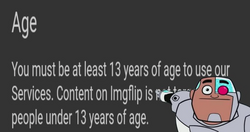Laws of the Web
The Web (broadly speaking) is a lawless place where people can stick slop, spam, defamatory material [1, 2], hateful material etc. It's not a new problem. It was the same in the 1990s and laws existed to tackle these things even back then (the Net predates the Web by several decades).
On the Web, any "old fart" or "Islamic radical" can post so-called 'content'. It's how the Web works. Some politicians attempted to change that, only later to understand the unintended consequences. Heck, a lot of politicians openly spread hate and even calls for assassination. Twitter very much tolerated that when Donald Trump kept doing it.
When it comes to a TOS, the aim isn't so much to control quality but to justify censorship proactively; even political content is subjected to censorship, not to mention fiction (like religions).
To bypass censorship (whose aim is to promote some particular worldview by deleting views one does not agree with) one must reduce reliance on third parties. That does not mean complete end of censorship, but it makes it a lot easier to speak freely and makes censorship far harder.
Paper tigers do not change the dynamics of it. They just add another layer of bureaucracy. █


